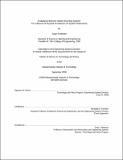Evaluating electronic waste recycling systems : the influence of physical architecture on system performance
Author(s)
Fredholm, Susan (Susan A.)
DownloadFull printable version (1.868Mb)
Other Contributors
Massachusetts Institute of Technology. Technology and Policy Program.
Advisor
Randolph E. Kirchain.
Terms of use
Metadata
Show full item recordAbstract
Many different forms of electronic waste recycling systems now exist worldwide, and the amount of related legislation continues to increase. Numerous approaches have been proposed including landfill bans, extended producer responsibility (EPR) and advance recovery fee (ARF) funded recycling systems. In order for policymakers and system architects to establish the optimal recycling system for their location, they need to know how to evaluate the performance of existing systems, and furthermore, how to use this information to design new systems. This thesis addresses the question: How does the physical system architecture of e-waste systems influence system performance? Specifically, it focuses upon the physical system architecture of collection site density and distribution. This thesis presents a systematic methodology developed with the Materials Systems Laboratory for characterizing recycling systems. Case studies of existing e-waste systems operating in Switzerland, Sweden, the Netherlands, Norway, Belgium, the Canadian province of Alberta and the US States of California, Maine and Maryland are examined for correlations between the environmental and financial performance of existing systems with respect to both the context and the architectural options of those systems. The case study analysis furthermore informs the construction of a model of e-waste systems. This model, which examines architectural choices in collection, transport, processing and system management of e-waste, is used to predict the environmental and financial performance of theoretical e-waste systems for a given location. The model was intentionally developed to be both broad, in order to encompass all pieces of recycling systems, and general, such that many different types of systems, both real and hypothetical, can be analyzed. Following an application of the model to several different combinations of system architecture and context, policy recommendations are made regarding the construction and evaluation of e-waste systems in various locations.
Description
Thesis (S.M. in Technology and Policy)--Massachusetts Institute of Technology, Engineering Systems Division, Technology and Policy Program, 2008. This electronic version was submitted by the student author. The certified thesis is available in the Institute Archives and Special Collections. Includes bibliographical references (p. 63-68).
Date issued
2008Department
Massachusetts Institute of Technology. Engineering Systems Division; Technology and Policy ProgramPublisher
Massachusetts Institute of Technology
Keywords
Engineering Systems Division., Technology and Policy Program.